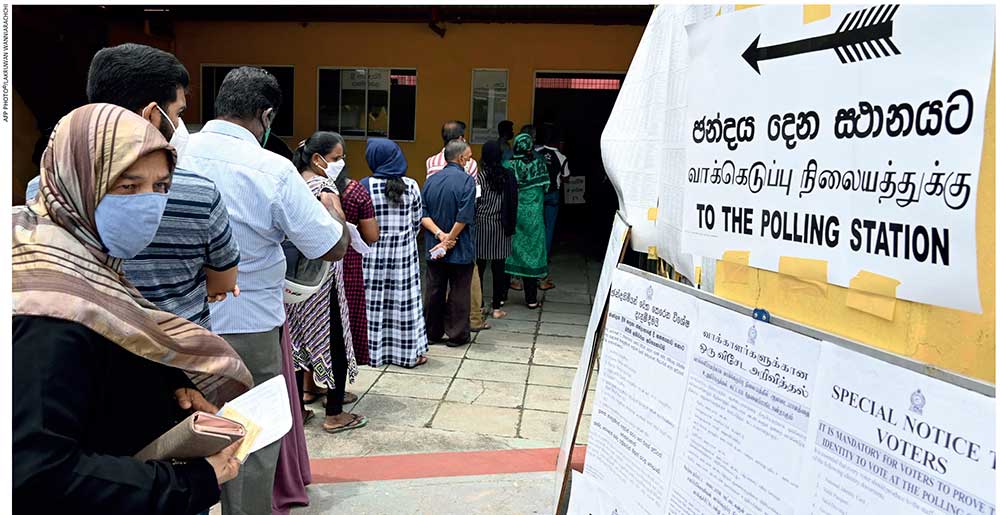STATE OF THE NATION
A RED FLAG FLIES OVER NATION AND STATE
Wijith DeChickera remains cautiously optimistic about the prospects ahead for a country as well as a political culture on the cusp of change

In under two months, Sri Lankan voters made treks to their respective polling centres to cast the ballot in a brace of vital elections. This was in a nation labouring under a plethora of woes brought on by decades of abysmal governance and correspondingly poor voter choices.
It is evident the electorate opted overwhelmingly for new political brooms to make a clean sweep – indeed, the winds of change have blown through the corridors of power and influence for a month or so.
A strong new government with a panoply of populist expectations pinned to a red flag should be ensconced in both the executive and legislative spheres of governance.
The results speak plainly of a people grown weary of ‘the usual suspects’: corrupt, cynical and incompetent. Their aspirations for competent government under compassionate governors appear to have been met in the twin helix of a president and parliament helmed by the National People’s Power (NPP).
The victors bring with them a promise and potential to cleanse the shambles Sri Lanka has become in every nook and cranny of its national being – a bonus reflected in the preferential votes cast for a slew of absolute newcomers.
City, tea kiosk, academic council, chamber and a country at large seemingly voted overwhelmingly for the dark horses that were until only recently considered the direst prospect for a nation state staggering under the burdens of economic reform and debt restructuring on the one hand, and the attendant need for stability and continuity on the other.
Such an irony was lost on the electoral losers?
In fact, the inability of those worthies – from second place finisher Samagi Jana Balawegaya (SJB) with 40 seats in parliament from 1.97 million votes through a decimated Sri Lanka Podujana Peramuna (SLPP) with a paltry three MPs in the house – to perceive the pain, anger, struggles, suffering and frustrated ambitions of those who punishingly wielded the franchise against them arguably constituted a major part of the problem.
On the contrary, the extraordinary appeal of the Janatha Vimukthi Peramuna (JVP) led NPP – with a super majority of 159 seats from 6.86 million votes – redounds to not only the sustainable and strategic campaigning carried out by its cadre islandwide in the runup to the poll but also the ‘spillover landslide effect’ the sweeping victory of President Anura Kumara Dissanayake had on voters susceptible to the greater national pulse at the time.
The results of two electorates speaks volumes for the hope, faith and confidence in the JVP voters outside its bailiwick invested in these relative newbies to power: Vanni electoral district where the NPP’s winning of two seats edged out the SJB and Ilankai Tamil Arasu Kadchi (ITAK) with a seat apiece; and the remarkable three it secured in Jaffna over ITAK’s one – the first time a non-Tamil party swept the poll in the northern capital.
On such pillars are built the hopes of a new Sri Lankan identity majoring on shared power and cooperative national developmental efforts, where racial disharmony and strife have prevailed.
In another unprecedented development, Sri Lankan voters elected 20 women to parliament, of which 18 are from the NPP (the other two being SJB MPs). This reflects the leftist coalition’s manifesto vision to increase female representation in the house. And it is but a slice of a pie that’s much larger than the interests of one segment of the voter population.
But the NPP demonstrated in its election speeches and policy statements that it has among its ranks – to say nothing of now being in the house – professionals and competent young politicos capable of managing “the extraordinary expectations of the electorate” (as a senior legal luminary phrased it) after the result was declared.
These span the gamut from developing the nation and stewarding the economic reforms process in tandem with managing IMF strictures; streamlining a burdensome tax regimen and controlling inflation meaningfully; addressing the hoary issues of national reconciliation and transitional justice; upholding the rule of law and order for all equitably; curbing corruption, waste and mismanagement; and perhaps abolishing the executive presidency in its time.
But a government with a super majority in parliament – a first for any administration under the Proportional Representation (PR) system – may, in addition to having its work cut out for it, have to safeguard itself from the pitfalls of an all-powerful regime that has the demonstrable goodwill of the people expressed with such largesse.
And for the sake of the generations of Sri Lankans who sacrificed life and limb on the altars of expediency and realpolitik in the past, as well as today’s children of Mother Lanka slated to pay the penalty for the errors of their elders, we hope, trust and expect that the NPP will deliver results under a new political culture that has everything in its favour to end the iniquities of decades.
May the movement that went from three seats in the house in 2019 to a super majority of 159 not raise any red flags!



